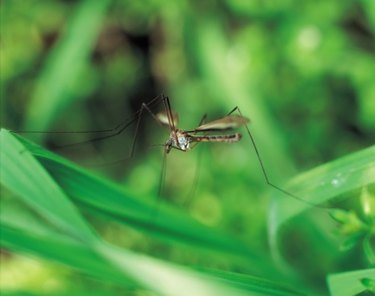
Stagnant water is standing water that has been sitting without moving for a significant amount of time. Any amount of water can become stagnant. Stagnant water is characterized by low oxygen levels. This makes it unsafe for consumption by humans and hazardous to life that normally exists in water. However, the features of stagnant water make it the perfect breeding ground for mosquitoes.
Smell
Video of the Day
Stagnant water does not emit an odor on its own. The odor associated with stagnant water arises from organisms or vegetation that cannot survive in the water. Because scavengers cannot live in the water, the plants and other organisms rot. As more organic matter begins to rot in the stagnant water, the smell gets worse. Stagnant water odor becomes more foul with time, because more organisms die.
Video of the Day
Low Oxygen Levels
Water sources are normally moving enough to agitate the water and bring oxygen in to be dissolved. This replaces the oxygen that fish and other life consume. In stagnant water, living things consume the oxygen, but it cannot be replenished.
Mosquitoes
While most living things perish in stagnant water, mosquitoes find it an ideal place to lay eggs. Mosquitoes go through multiple stages of life before they leave the water. Stagnant water must remain for four days for the larva to complete the life cycle. Eliminating or disinfecting stagnant water can eliminate mosquito breeding grounds. Mosquitoes are capable of spreading many diseases to humans and animals.
Algae
Some types of algae live comfortably in environments with little oxygen available. The algae will form on the bottom or sides of whatever encloses the stagnant water. The presence of algae indicates that the water is stagnant because, if the water were agitated, oxygen would be introduced, and the algae would not be able to survive.